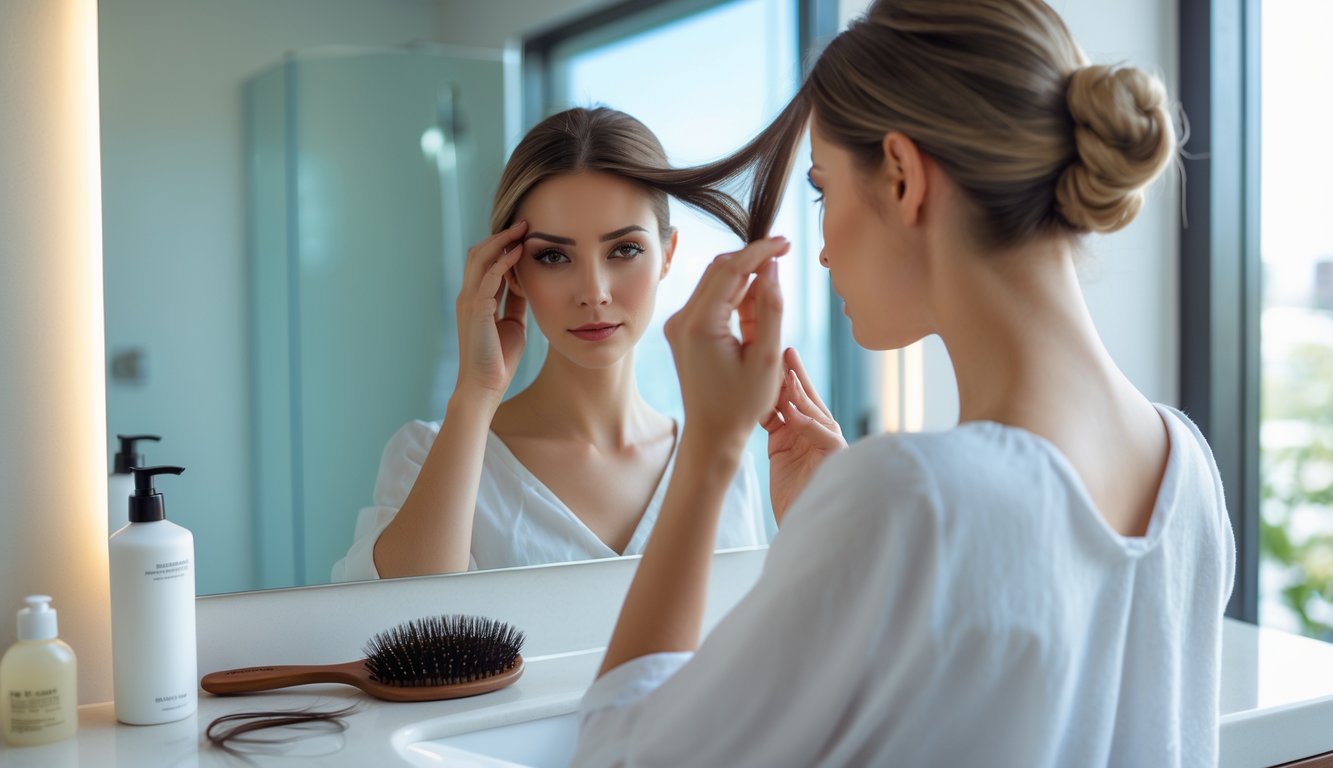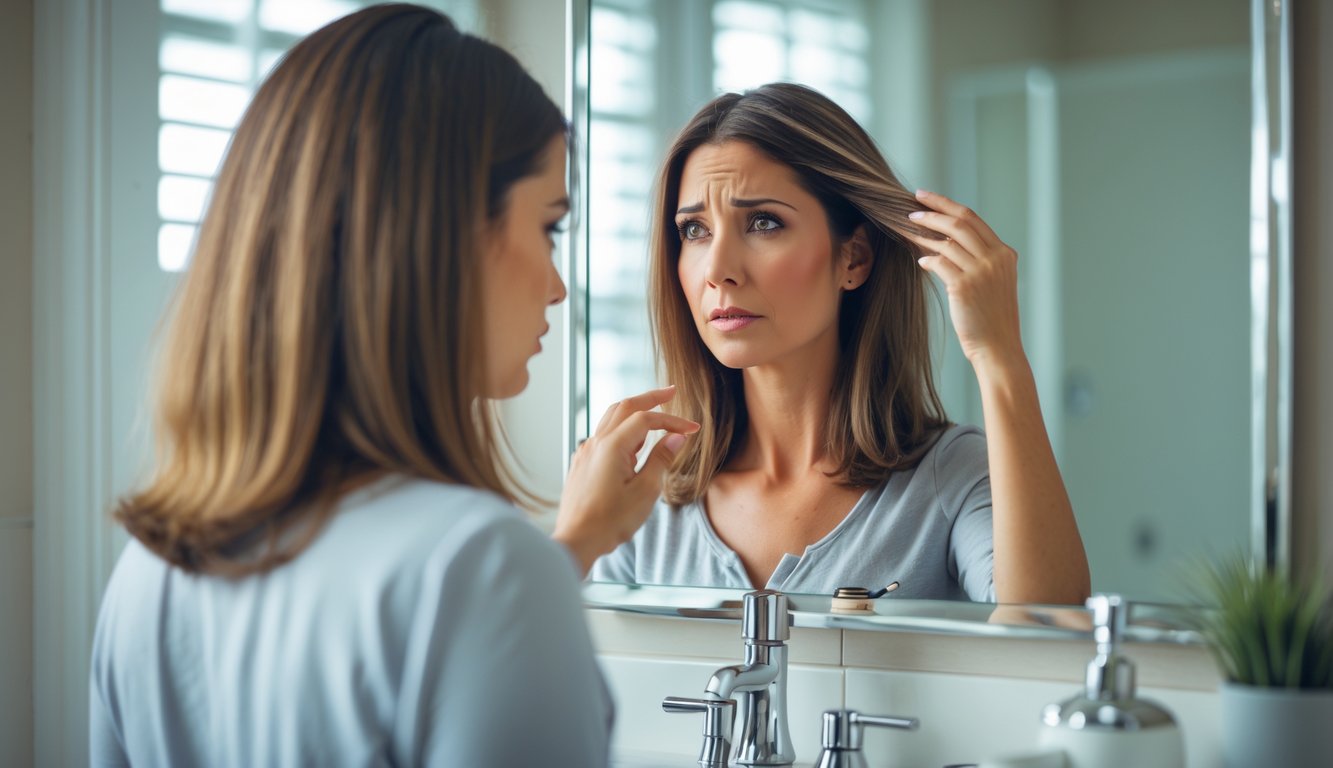
The Link Between Stress and Hair Loss
Of course, nobody ever told me stress could literally make my hair fall out. I thought it was just a mood thing, but turns out, chronic stress, cortisol spikes, bad breakups, whatever—your hair gets the memo and starts bailing.
Chronic Stress and Hair Health
I know this nurse who works endless night shifts—she started losing hair by the handful. Her dermatologist said it’s classic: months of stress push your hair follicles into the resting phase, and then, boom, telogen effluvium. Not rare at all.
Mayo Clinic says the thinning might not even show up until three months after the crisis. Which is honestly unhelpful, because how are you supposed to figure out what started it? Hair is slow to react, like a delayed fire alarm. And chronic stress stalls regrowth. People push supplements and silk pillowcases, but if you’re still stressed, don’t expect miracles.
Physical and Emotional Stress
Physical stuff counts too—surgery, anemia, crash diets, high fevers. My friend’s mom had COVID and lost hair in clumps a month later. Emotional stuff? Divorce, grief, deadlines, doomscrolling—hair doesn’t care what the trigger is.
A hair specialist said in a recent interview that stress-related hair loss usually isn’t forever. If you actually deal with the stress (therapy, mindfulness, a walk, whatever), hair might come back. But if you don’t? Good luck. Shampoos aren’t going to cut it.
I keep telling myself I’ll start yoga, but mostly I just wear headphones and pretend I can’t hear the neighbor’s dog.
Cortisol and the Hair Cycle
Cortisol—everyone’s favorite villain. Dermatologists say when it spikes, it sets off inflammation in your scalp and messes with the hair growth cycle. I’ve seen editorials and “burnout patient” bloodwork where high cortisol lines up with thinning hair, but what counts as “high”? Nobody agrees. Gut feeling? Lab numbers? The number of unread emails? I don’t know. Either way, ignoring stress hasn’t done my hair any favors. Science is still arguing about details, but I’m convinced enough.
Diet, Nutrition, and Hair Thinning
Why do I eat all the “right” things and still shed like a golden retriever? Some mornings it’s coffee and nothing else, other days I’m virtuous with eggs and spinach. Hair doesn’t seem to care. If anyone says diet barely matters, they’ve never seen my shower drain.
Essential Vitamins and Minerals
Vitamin D confuses me. Supposedly, low D means slow regrowth, but I get sunburnt and still lose hair. I take a multivitamin with D3 now, just in case. Biotin? It’s on every “hair” supplement, but apparently, actual biotin deficiency is rare. Still, people buy it like it’s magic.
Zinc and B12—can’t forget those. If I skip red meat or dairy, suddenly I’m googling “zinc deficiency symptoms.” My nutritionist friend (always eating avocados) says zinc, B vitamins, A, E, all matter for hair cells. Why do vitamin gummies taste so much better than actual food? Distracting.
Iron and Anemia
Iron is the sneaky one. Not just for pregnant women or runners—iron deficiency anemia is a huge reason women lose hair. Ferritin is the number you want, but most labs don’t check it. If I forget spinach, lentils, steak for a few weeks, I get dizzy, then notice more hair in the sink. Teenage vegetarians, heads up.
Supplements are a mess—ferrous sulfate, chelates, whatever. Some make me nauseous. Harvard Health says not everyone needs iron, but if you do, no topical serum will fix it. Also, why do iron pills smell like pennies? Gross.
Nutrient Deficiencies and Supplements
Sometimes labs look fine but your hair’s still thinning. My cousin had perfect numbers, lost hair all winter anyway. Real deficiencies—folate, E, zinc—happen after crash diets, surgery, illness. Most hair gummies are just biotin, but my dermatologist (grumpy but smart) says extra biotin rarely helps unless you’re actually low.
My pantry is full of half-used supplements—multis, fish oil, random silica pills. None are FDA tested for hair. Eating more omega-3 foods like salmon or eggs? Helped my scalp itch, but didn’t exactly give me thick hair. Anyone promising “fullness in four weeks” is selling snake oil. Also, vitamin C chewables taste like sidewalk chalk. No offense to oranges.
Medical Conditions That Lead to Hair Thinning

So, yeah, I’m the person yanking hair out of the shower drain, staring at it like it’s going to confess something. Why is it always a toss-up between blaming my immune system, my family tree, or that “extra gentle” shampoo that was probably just lying to me? It’s like, every time I Google, another culprit pops up: chronic illnesses, genetics, scalp nonsense, infections—pick your poison. And nobody, literally nobody, hands you a manual for this.
Alopecia Areata and Autoimmune Diseases
Look, my scalp starts acting up and suddenly I’m doomscrolling images of “patchy hair loss” at 2am. Alopecia areata, which sounds like a villain in a medical drama, is just your immune system getting bored and deciding to attack your hair follicles for kicks. Apparently, about 2% of people worldwide get this, which sounds small until you realize it’s probably someone you know, or, you know, you.
I’ve read autoimmune stuff is basically your body flipping a coin and attacking random parts—follicles, thyroid, skin, whatever. So you wake up with bald spots that weren’t there yesterday, and if you’re really lucky, you get bonus symptoms like thyroid drama or weird skin changes. Dermatologists keep saying things like “corticosteroids might help” or “topical immunotherapy,” but honestly, my doctor just told me to wait it out. Super helpful. If you want to spiral further, here’s Ziering Medical on medical conditions leading to hair loss.



